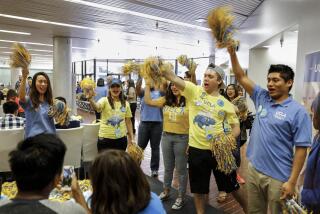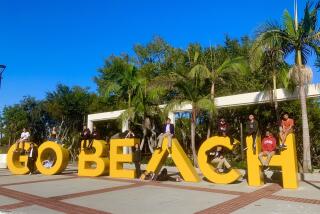UC regents seek ways to expand financial support and speed graduation
University of California regents are looking at ways to make UC educations more affordable, including handing out grants for summer school and giving students multiyear financial aid commitments.
A recent survey found that the 10-campus UC system awards the most generous freshman financial aid of top public universities nationwide, averaging $19,000 to $22,000 annually. UC campuses also enroll a higher share of low-income students than their peers. About 4 in 10 UC students receive federal Pell grants.
But regents will consider another tuition increase at their next meeting in January, and some of them at their meeting Wednesday said they need to do more to help.
“It seems we’re not doing our job,” said Lt. Gov. Gavin Newsom, an ex-officio regent.
The regents discussed a new UC report on university affordability. For students who are California residents, the report said, the average cost of attending and living on campus this school year is $34,717, including about $13,900 in tuition and fees. About three-quarters of students receive financial aid and more than half pay no tuition.
The report, compiled by a group of regents, administrators, faculty and students, offered eight recommendations — two of which drew particular attention.
One idea was to adopt UC Santa Barbara’s groundbreaking Promise Scholars Program, to give talented, low-income students predictable financial support through a multiyear aid commitment rather than the usual year-to-year pledges. The program currently guarantees about 275 undergraduate scholars a minimum of $120,000 over four years, while transfer students get a minimum of $60,000. About 90% of the scholars are the first in their families to attend college and the average family income is about $25,000, said Michael M. Miller, the campus financial aid director.
“They are extremely successful … and are on track to graduate,” Miller told the regents.
UC Merced plans to launch a similar program next fall.
Regents also discussed a recommendation to seek state Cal Grants for summer sessions, which would help students graduate more quickly. Low-income students graduate at about the same rates as more affluent peers, but are more likely to take more than four years to do so.
Board Chairman George Kieffer suggested that UC immediately push for state legislation to expand Cal Grants to summer sessions.
In other matters, UC administrators presented recommendations for how to avoid the kind of enrollment fiasco that UC Irvine set off last summer when it abruptly withdrew nearly 500 admission offers after discovering that about 850 more students were enrolling than they had expected.
UC Irvine, in its own internal audit released this month, found that the pressures of the over-enrollment had prompted campus administrators to take a harder line than usual — rescinding offers to those who missed deadlines to submit such required materials as senior-year grades. The campus missed its mark in accurately predicting enrollment mainly because of inadequate communication between different offices involved in admissions, the audit found.
UC Chancellor Howard Gillman ultimately reinstated nearly all of the students, apologizing to them and their families for the “unacceptable distress” caused. The campus plans to increase staff, expand training and improve technology to make sure such problems don’t reoccur.
A broader UC report that looked at rescinded offers systemwide recommended that campuses not use academic verification — making sure students send in senior-year grades to prove they have not failed any classes, for instance — as a means of managing enrollment.
On Thursday, regents plan to discuss an independent investigation that found top aides of UC President Janet Napolitano interfered with a state audit in a way that suppressed campus criticism of her office’s operations and services.
More to Read
Start your day right
Sign up for Essential California for news, features and recommendations from the L.A. Times and beyond in your inbox six days a week.
You may occasionally receive promotional content from the Los Angeles Times.







